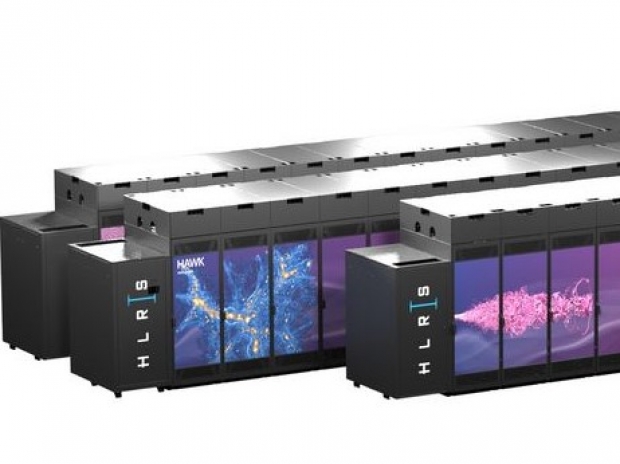Dubbed Hawk, the computer can manage 26 Petaflops (26 trillion floating-point operations per second) and is an Apollo 9000 System from Hewlett Packard Enterprise (HPE).
It is one of the fastest supercomputers worldwide and the fastest general-purpose system for scientific and industrial computing in Europe.
Hawk has two AMD EPYC Rome 7742 CPUs in each node which means 720,896 cores each running at a 2.25 GHz frequency.
Wolfram Ressel, Rector of the University of Stuttgart, welcomed the inauguration of the new supercomputer: "Hawk expands the University of Stuttgart's already excellent research infrastructure with an additional flagship system. It will enable cutting edge academic and industrial research in a wide range of contexts where simulation and Big Data play important roles. The new high-performance computer also makes an important contribution to realizing the University of Stuttgart's vision, Intelligent systems for a sustainable society."
With a peak performance that is 3.5 times faster than HLRS's previous flagship computing system — Hazel Hen — Hawk will open completely new academic and industrial application areas and empower scientists and engineers to conduct research on ever larger and more complex phenomena.
Among Hawk's future application areas are, for example, gaining a new understanding for optimising energy efficiency in wind turbines, optimising motors and power plants, or improving aerodynamic performance in aircraft and automobile engineering. Hawk could, for example, for the first time make it possible to create a detailed simulation of noise generation for an entire aircraft or calculate the complex interactions between global and regional climate models to enable mid-term predictions of climate change. More comprehensive and more complex simulations related to pandemic research, the prediction of migration flows, and other global challenges will also become possible with Hawk.
More, in addition to supporting academic research, HLRS makes it possible for private industry to access its supercomputing technologies. Up to 10 percent of Hawk's computing time is available to provide crucial support for the digitalisation of the industry in Baden-Württemberg and Germany. Currently, more than 40 (primarily medium-sized) companies perform computational research on HLRS's systems. Stuttgart and the Gauss Centre for Supercomputing stand alone in Europe.
Science Minister Theresia Bauer said: "The concept of high-performance computing means rapid development. As quickly as the peak performance of supercomputers rises, it has an equally decisive impact for cutting-edge research and for the development of innovative products and processes in key sectors of our economy. In all things related to supercomputing, Baden-Württemberg is a European leader and globally competitive. Having HLRS as a part of the University of Stuttgart is an important part of this. It means that it is not just the impressive computational performance of the supercomputer — but also the entire methodological expertise located here — that enables our leading computational research to achieve breath-taking results."




